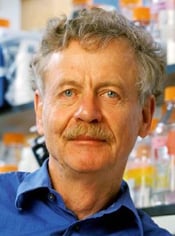 Rudolf Jaenisch, MD, professor of biology at Massachusetts Institute of Technology and a member of the Whitehead Institute, will deliver the ninth annual M.C. Chang Distinguished Lecture on Wednesday, May 14. The lecture is supported by the M. C. Chang Memorial Fund, a permanent endowment established at the Worcester Foundation for Biomedical Research to honor Dr. Chang’s pioneering contributions to the study of reproductive biology and early development, including co-discovery of the birth control pill.
Rudolf Jaenisch, MD, professor of biology at Massachusetts Institute of Technology and a member of the Whitehead Institute, will deliver the ninth annual M.C. Chang Distinguished Lecture on Wednesday, May 14. The lecture is supported by the M. C. Chang Memorial Fund, a permanent endowment established at the Worcester Foundation for Biomedical Research to honor Dr. Chang’s pioneering contributions to the study of reproductive biology and early development, including co-discovery of the birth control pill.
Dr. Jaenisch (at right) is a pioneer of transgenic science and a world leader in the fields of epigenetics and therapeutic cloning. He generated the first transgenic mice carrying exogenous DNA in the germ line and was the first to use insertional mutagenesis for identifying genes crucial for embryonic development. Perhaps his most fundamental contributions have been in the study of epigenetic processes during mammalian development. In particular, he showed that methylation of DNA plays important roles in gene expression, imprinting, and X-inactivation as well as in diseases such as cancer and mental retardation.
Jaenisch’s work has focused on mammalian cloning and has defined some of the molecular mechanisms that are crucial for nuclear reprogramming. More recently, he has used direct reprogramming of somatic cells to generate induced pluripotent stem cells in the culture dish. These cells are relevant to establishing in vitro systems to study major human diseases and eventually to derive cells that could be used for customized therapies.
The lecture, which will take place in the Albert Sherman Center Amphitheater from 4 to 5 p.m., is presented by the Worcester Foundation for Biomedical Research. The foundation became affiliated with UMass Medical School in 1997, prior to which it had built a reputation as one of the leading biomedical research institutes in the country, and achieved international recognition for its contributions to biology and medicine.